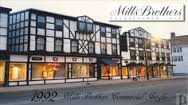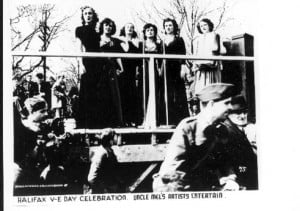Who killed Mills Brothers?
 The iconic Spring Garden Road women’s retailer — which launched in 1919 when “carriage trade” was still more literal than metaphorical — shuttered its sliding doors Tuesday. It disappeared into receivership, putting 20 employees — some of whom had greeted customers for 30 years — out of work.
The iconic Spring Garden Road women’s retailer — which launched in 1919 when “carriage trade” was still more literal than metaphorical — shuttered its sliding doors Tuesday. It disappeared into receivership, putting 20 employees — some of whom had greeted customers for 30 years — out of work.
Perhaps it’s because Mills was the last — remember The Cameo Restaurant, Mahon’s Stationery, Winsby’s Shoes, Maritime Frame-It — local business from Spring Garden Road’s glory days as the “busiest shopping street east of Montreal.”
Or perhaps it was Mills’ own special place in Halifax social history. During World War II, for example, co-founder Hugh Mills created Uncle Mel’s Concert Parties, a massive musical and theatrical troupe, to entertain thousands of military personnel stationed in, or passing through Halifax. Mills’ animated Christmas window display, featuring Snow White and the Seven Dwarves, was a seasonal tradition in the city.
Whatever the cause, losing Mills resonated last week. And raised a question: who, or what, killed Mills?
Mills had remained in family hands until local entrepreneur Mickey MacDonald bought the business in 2007, more for its prime location than its retail innards.
Some blamed MacDonald.
MacDonald blamed the street people who hang out on Spring Garden for scaring away rich lady customers, and called for more police.
In 2012, he sold Mills to four professional women, none with retail experience, who eventually became two and relocated west on Spring Garden.
Some blamed them for abandoning Mills traditional target market — women over 40 — in favour of what they billed as “the most-amazing fashion-shopping experience this side of Toronto, Montreal and New York.”
Fellow business owners blamed high rents and high property taxes, and called on the city to “step forward” and provide relief, if not leadership.
Kurt Bulger, the co-owner of nearby Jennifer’s of Nova Scotia, argued this closure was simply “the culmination of about 25 years of horrid planning decisions by the city, allowing unchecked, unbridled residential development outside the core.”
Not to forget all those city land deals that subsidized big box retailers. Etc., etc.
In the end, none of that matters much. As Mickey MacDonald put it: “People are going to miss it, the memory of the Mills. Maybe more than Mills itself.”
Mills Brothers, RIP.




 STEPHEN KIMBER, a Professor of Journalism at the University of King's College in Halifax and co-founder of its MFA in Creative Nonfiction Program, is an award-winning writer, editor and broadcaster. He is the author of two novels and eight non-fiction books. Buy his books
STEPHEN KIMBER, a Professor of Journalism at the University of King's College in Halifax and co-founder of its MFA in Creative Nonfiction Program, is an award-winning writer, editor and broadcaster. He is the author of two novels and eight non-fiction books. Buy his books